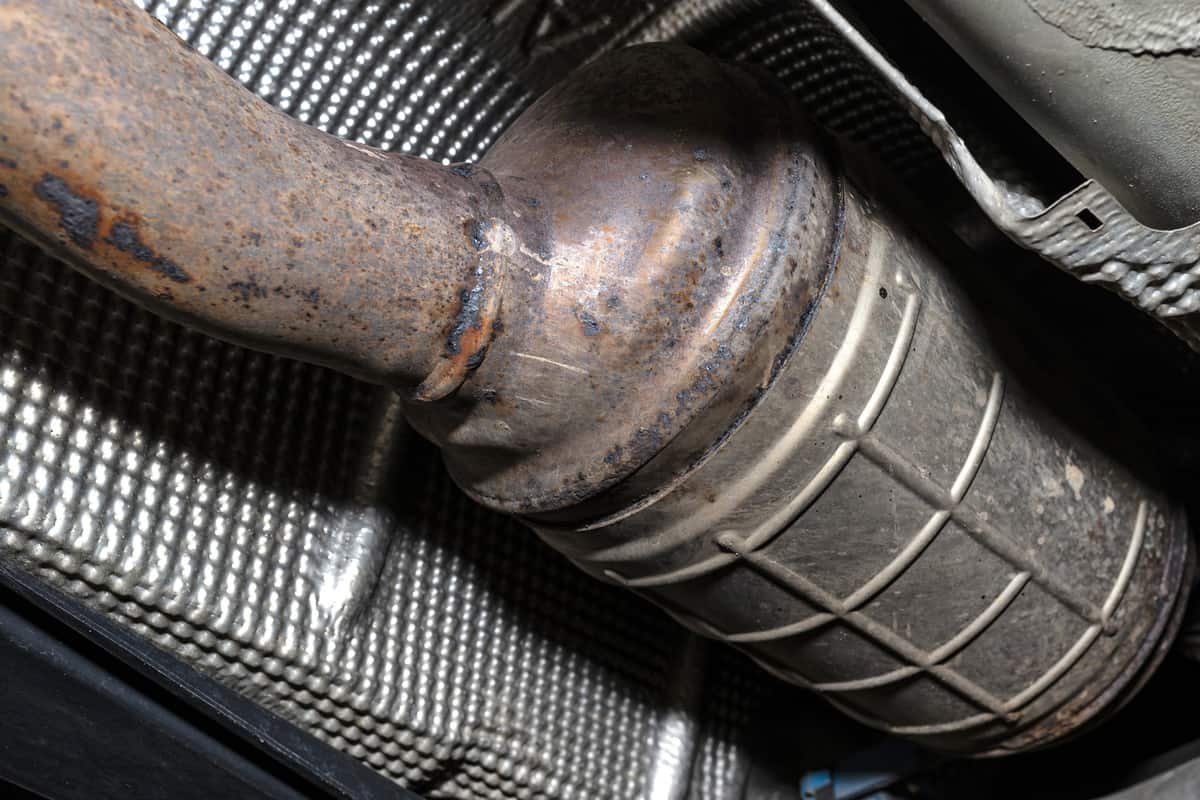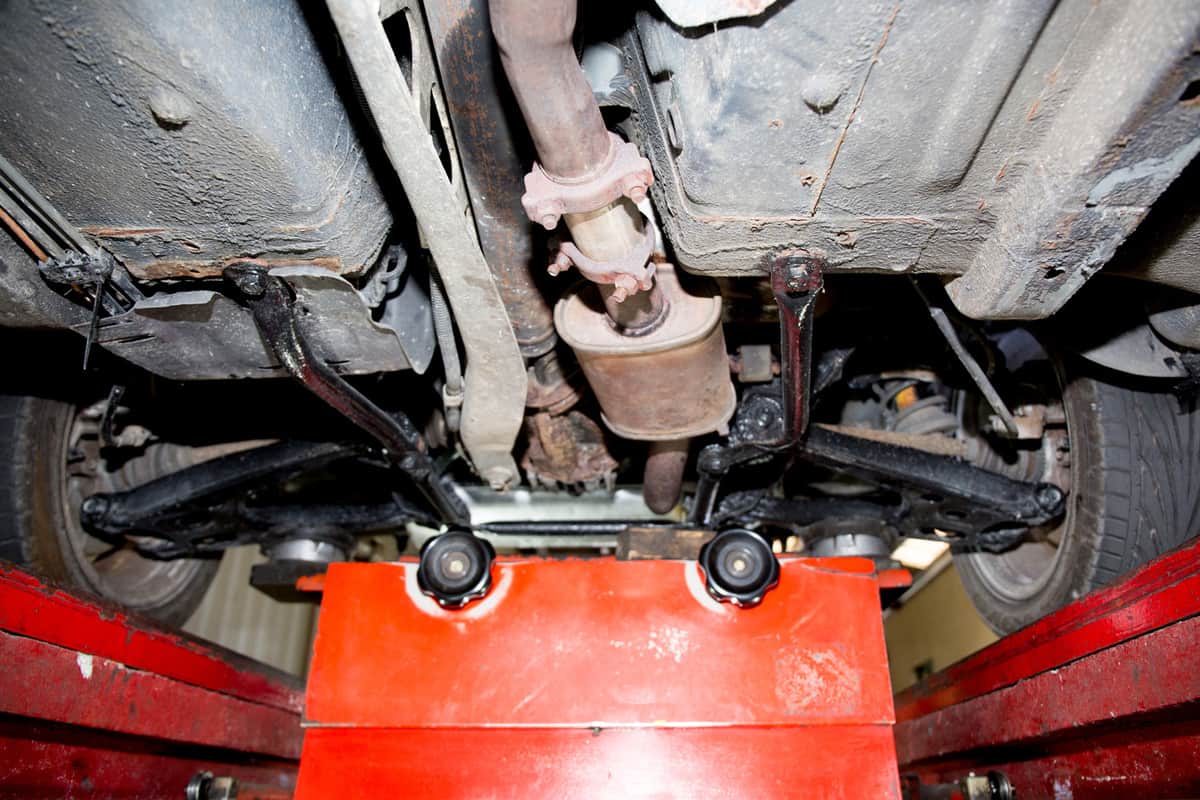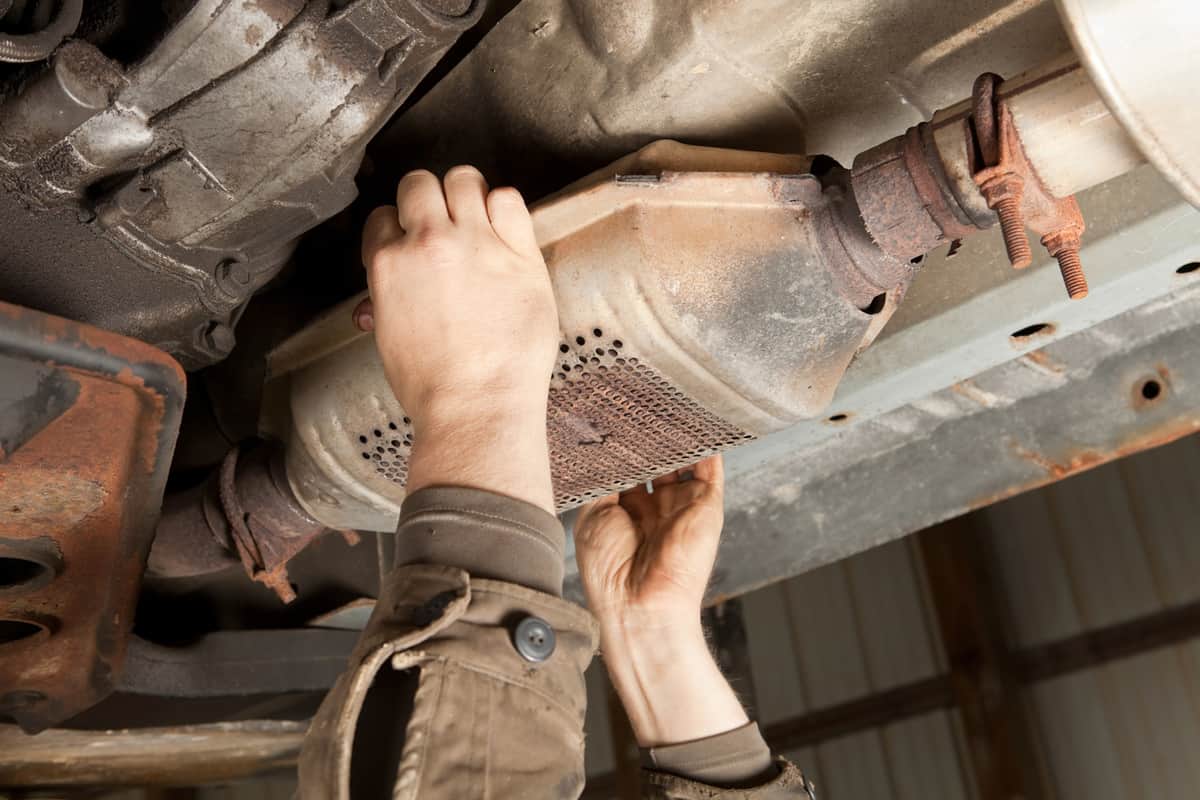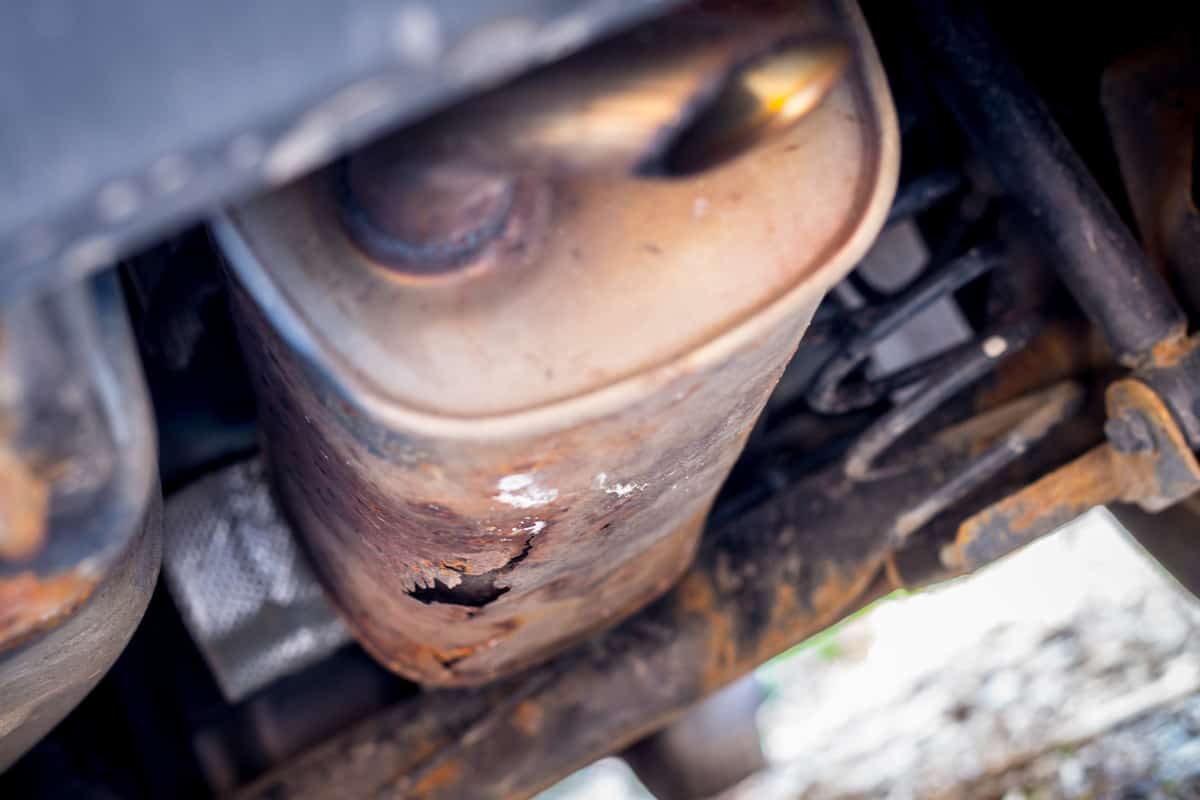Like any mechanical part in a vehicle, catalytic converters will eventually wear down and must get replaced. But what causes a catalytic converter to fail? We did some research to figure out more.
There are more than a few reasons why a catalytic converter goes bad. Here are some of the most common causes:
- Age and mileage
- Overheating
- Contaminated oil
- Bad fuel
- Low coolant level
- Unburned fuel
- Faulty oxygen sensor
- Road damage
- Short trips
- Fuel additives
- Bad spark plugs/wires
- Exhaust leak
As you can see, there are many problems that can cause your catalytic converter to fail. In this article, we will discuss each of these in more detail. Also, we will answer other frequently asked questions about catalytic converters, so read on!
![Catalytic converter. Exhaust system of a modern car bottom view, Why Do Catalytic Converters Go Bad? [12 Reasons Explained]](https://vehq.com/wp-content/uploads/2022/04/Why-Do-Catalytic-Converters-Go-Bad-12-Reasons-Explained.png)
What Can Cause A Catalytic Converter To Go Bad?
A catalytic converter is a device that helps to reduce the amount of pollution in a car's exhaust. It does this by converting harmful pollutants into less harmful ones.
Over time, however, catalytic converters can become clogged or damaged, causing them to be less efficient.
There are many things that cause a catalytic converter to go bad. Let's look at each one below:

1.Age and Mileage
Over time, catalytic converters can become clogged with built-up deposits. This is especially true if the car has a high mileage. On average, you can expect a catalytic converter to last around 10 years or 100,000 miles.
Before you buy a used car, always ask for a carfax report to avoid buying a car with a catalytic converter that needs replacing.
2. Overheating
If your car's engine overheats, it can damage the catalytic converter. That's because the converter is made of metals that can melt or distort when exposed to high temperatures.
To avoid damaging your catalytic converter, monitor your car's coolant and oil level and get any leaks fixed as soon as possible.
3. Contaminated Oil
If your car's oil is dirty or contaminated, it can clog the catalytic converter. That's because the oil can build up on the converter's honeycomb-shaped structure, restricting the flow of exhaust gases.
To prevent this from happening, always change your car's oil according to the manufacturer's recommendation. Also, have your oil changed on time even if you don't hit the mileage mark.
Last, consider using synthetic oil, which can help to prolong the life of your engine and catalytic converter.
4. Bad Fuel
If you use low-quality fuel or fuel with water, it can damage your catalytic converter. That's because the water can rust and corrode the metals in the converter.
What's more, if your vehicle sits unused for an extended period, the fuel can evaporate and leave behind a sticky residue that can clog the converter.
To prevent this from happening, always use high-quality fuel and add a fuel stabilizer if you know your car will be sitting.
5. Low Coolant Level
If your car's coolant level is low, it can cause the engine to overheat and damage the catalytic converter. That's because the coolant helps keep the engine cool by absorbing heat.
Typically, a coolant leak is the cause. If you notice your car's coolant level is low, take it to a mechanic to have it checked out.
6. Unburned Fuel
If your car's engine is running too lean (not getting enough fuel), it can cause the catalytic converter to overheat and fail. Any fuel that gets through the combustion chamber and isn't burned will burn in the converter, causing it to overheat.
Several things can cause this, including a dirty air filter, bad spark plugs, or a faulty oxygen sensor.
Typically, you might throw a check engine light if your vehicle doesn't have the right air-to-fuel ratio. So, if you notice your check engine light is on, take your car to a mechanic to have it checked out.

7. Faulty Oxygen Sensor
The oxygen sensor measures the amount of oxygen in a car's exhaust. If it's not working properly, it can cause the engine to run too lean, which can damage the catalytic converter.
In addition, a faulty oxygen sensor can also cause your car to experience poor gas mileage and emit higher levels of pollution. Typically, a bad O2 sensor will throw a check engine light. When this happens, scan for codes.
If you notice your check engine light is on, take your car to a mechanic and have them hook it up to a diagnostic mace to see if the oxygen sensor is the problem.
8. Road Damage
One final thing that can damage your catalytic converter is road debris. If you hit a pothole or something else on the road, it can cause the converter to crack or break.
When you hear a loud noise when you hit something on the road, pull over and check for any damage. If you see anything that looks out of place, take your car to a mechanic to have it checked out.
9. Short Trips
It might sound odd, but only using your car for short trips can damage your catalytic converter.
That's because the converter needs to reach a certain temperature to work properly. If you only use your car for short trips, it might not have enough time to reach that temperature, shortening its lifespan.
To avoid hydrocarbons from building up in the converter, try to take your car for a drive on the highway every so often.
10. Fuel Additives
While fuel additives won't damage your catalytic converter, they can reduce its effectiveness.
Most fuel additives contain chemicals that can coat the converter's honeycomb-shaped structure, which then limits its ability to catalyze.
If you're using a fuel additive, read the label carefully. Some fuel additives are specifically designed with catalytic converters, while others are not.
11. Bad Spark Plugs/Wires
When a car's spark plugs or wires go bad, it can cause the engine to misfire. When this happens, unburned fuel can get through the combustion chamber and into the exhaust system.
12. Exhaust Leak
If your car has an exhaust leak, it can allow more hot air to enter the catalytic converter. This can cause the converter to overheat and fail.
If you notice your car's exhaust system is leaking, take it to a mechanic to have it repaired.
This can damage the catalytic converter by causing it to overheat. It can also cause a build-up of carbon on the converter, eventually leading to clogging.
To prevent this from happening, replace your spark plugs and wires according to your car's maintenance schedule.

How Much Does It Cost To Replace A Catalytic Converter?
Since catalytic converters use precious metals like platinum, palladium, and rhodium, they can be expensive to replace. The cost of a new converter can range from $500 to $2,000 or more, depending on the make and model of your car.
If you need to have your catalytic converter replaced, it's important to take your car to a reputable mechanic. Catalytic converters are sensitive components, and if they're installed incorrectly, they can cause serious damage to your car.
While it is an expensive fix, letting them go completely can lead to irreversible engine damage. So, if you think your catalytic converter is going bad, have it checked out as soon as possible.
What Are The Symptoms Of A Bad Catalytic Converter?
There are some warning signs to watch for that may indicate your catalytic converter is going bad.
If you notice any of these symptoms, it's important to take your car to a mechanic to have it checked out.
Reduced Fuel Economy
One of the first signs there's a problem with your catalytic converter is reduced fuel economy. If your car starts using more fuel than usual, it's a sign that something is wrong.
The catalytic converter helps to convert fuel into energy, so if it's not working properly, your car will use more fuel to compensate.
Decreased Engine Performance
If your catalytic converter is going bad, you might notice a decrease in your car's engine performance.
This is because the converter helps remove pollutants from the exhaust, so if it's not working properly, those pollutants can build up and cause problems.
You might notice your car has less power than usual or take longer to accelerate. You might also notice your car is idling rough.
Dark Exhaust Smoke
If you see dark exhaust smoke coming from your car's tailpipe, it's a sign that the catalytic converter is not working properly. This is because of the build-up of deposits in the converter, which get burned and released in the exhaust.
Foul Smell
When a catalytic converter fails, it could smell like rotten eggs or sulfur. When the build-up of pollutants in the exhaust system are burned, it causes the foul smell.
If you notice any of these symptoms, it's important to take your car to a mechanic to have it checked out.

Final Thoughts
If you think your catalytic converter is going bad, it's important to take your car to a mechanic to have it checked out.
While it is expensive to fix, letting the converter go completely will most likely lead to irreversible engine damage. So, if you notice any of the symptoms we've listed above, have your car looked at as soon as possible.
Made it to the end? Here are other articles that you might find helpful:
Do Catalytic Converters Have Serial Numbers?
How To Find Catalytic Converter Scrap Value By Serial Number
Can You Drive With A Bad Catalytic Converter [And For How Long]?
